What is the function of trim function of solid state drive?
The trim function of solid-state drives is mainly to optimize solid-state drives, solve the problems of slowdown and lifespan after SSD use, and improve SSD efficiency by preparing data blocks for reuse. The Trim function is a function that almost all SSD solid state drives have. It is an ATA command. When the system confirms that the SSD supports Trim and deletes data, it does not notify the hard disk of the deletion command and only uses the Volume Bitmap to remember that the data here has been deleted. This enables faster data processing.

The operating environment of this tutorial: Windows 7 system, Dell G3 computer.
The Trim function is a function that almost all SSD solid state drives have. It is an ATA command. When the system confirms that the SSD supports Trim and deletes data, it does not notify the hard disk of the deletion command and only uses the Volume Bitmap to remember this. The data has been deleted. Volume Bitmap is just a disk snapshot, and its creation speed is much faster than directly reading and writing the hard disk to mark deleted areas. This enables faster data processing.
To put it simply, TRIM is a function that optimizes solid-state drives, solves the problems of slowdown and lifespan after SSD use, and improves SSD efficiency by preparing data blocks for reuse.
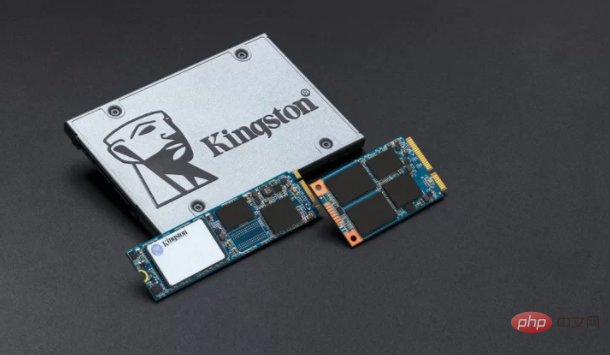
TRIM and data blocks
Originally on the mechanical hard disk, when writing data, Windows will Notify the hard disk to erase the previous data before writing new data to the disk. When deleting data, Windows will only mark it here, indicating that there should be nothing here, and wait until the data is actually written before actually deleting it, and the marking action will remain in the disk cache until the disk is free. and then execute again.
As a result, the disk needs more time to perform the above operations, and the speed will of course slow down.
When Windows recognizes the SSD and confirms that the SSD supports Trim, when deleting data, it will not notify the hard disk of the deletion command, and will only use the Volume Bitmap to remember that the data here has been deleted. Volume Bitmap is just a disk snapshot, and its creation speed is much faster than directly reading and writing the hard disk to mark the deleted area. This step has already saved a lot of time. Then when writing data, since NAND flash memory saves data in purely digital form, new data can be written directly to the deleted blocks in the snapshot based on the Volume Bitmap without spending time erasing it. original data.
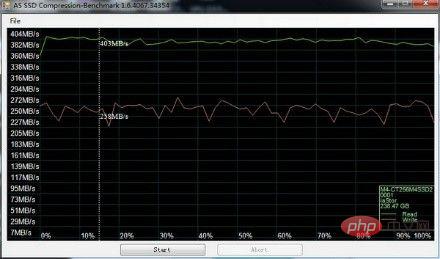
CRITICAL SSD AND TRIM/GARBAGE COLLECTION
The TRIM instruction allows the operating system to tell the solid state drive which Data blocks are never used again; otherwise the SSD controller does not know to recycle these idle data blocks. The simplicity of TRIM will greatly reduce the write load while allowing the SSD to better pre-delete idle data blocks in the background so that these data blocks can be more quickly prepared for new writes.
Since not all operating systems support TRIM, Crucial SSD has a special function called Active Garbage Collection. Active garbage collection is a process that helps SSDs maintain good performance by freeing memory sectors that are no longer in use. Garbage collection is part of the SSD itself and therefore does not depend on the computer's operating system. That is, it will work fine no matter which operating and filing system the computer uses.
But please note: Garbage collection only works when the Crucial SSD is idle, so make sure the system does not go to sleep when idle. Garbage collection takes time to complete its work, but as long as it sits idle, the Crucial SSD will maintain a high level of performance.
How to check and enable Trim support
When we purchase a new hard drive, the system of win7 or above recognizes the SSD and confirms that the hard drive supports After Trim, this function will be automatically enabled. If it is not turned on, it means that the SSD driver installed in the system is older and can be solved by downloading and installing the latest firmware.
Methods to check whether the SSD has Trim support enabled in Windows systems:
Run CMD as an administrator and enter fsutil behavior query disabledeletenotify If the displayed result is DisableDeleteNotify=0 means it is enabled. If it is 1 it means it is not enabled.
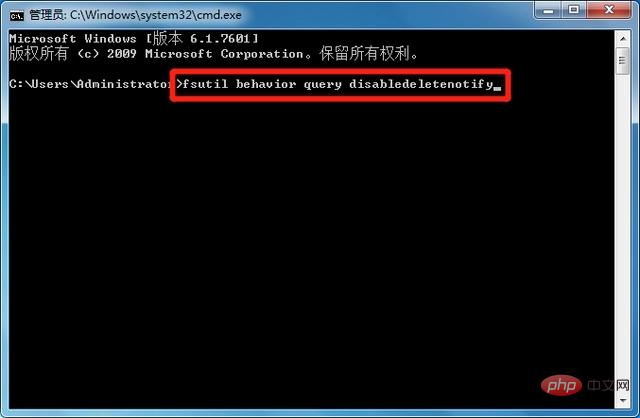
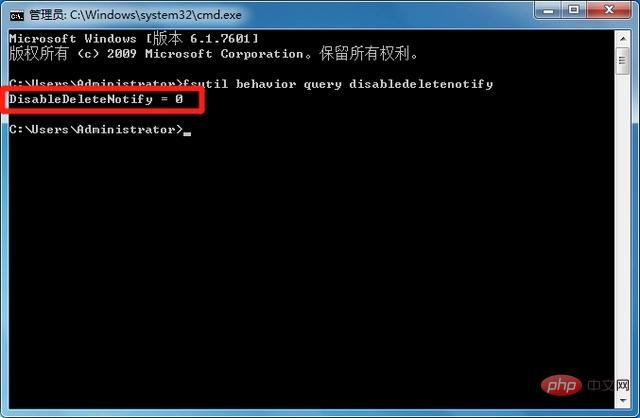
How to turn on trim
Run CMD as administrator and enter fsutil behavior set disabledeletenotify 0
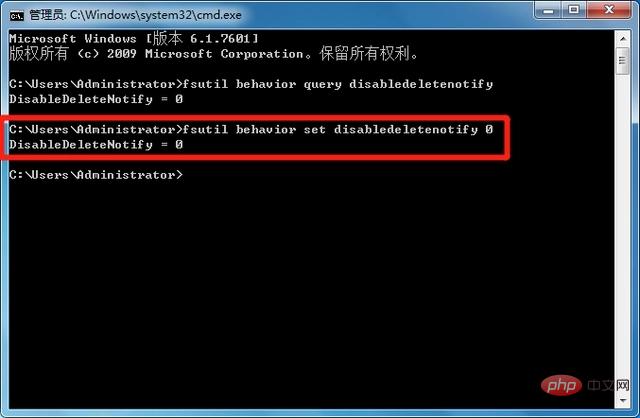
How to turn off trim
Run CMD as administrator and enter fsutil behavior set disabledeletenotify 1
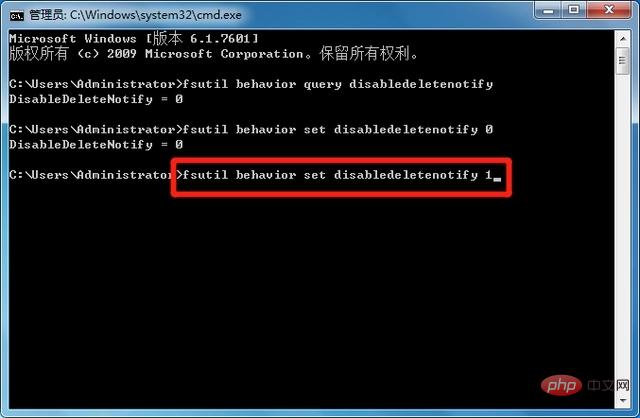
Instructions : After turning on Trim on SSD solid state drives, deleted or formatted files are almost impossible to recover. This is also the biggest bug of solid state drives at present. Therefore, important data is still placed on the mechanical hard drive.
For more related knowledge, please visit the FAQ column!
The above is the detailed content of What is the function of trim function of solid state drive?. For more information, please follow other related articles on the PHP Chinese website!

Hot AI Tools

Undresser.AI Undress
AI-powered app for creating realistic nude photos

AI Clothes Remover
Online AI tool for removing clothes from photos.

Undress AI Tool
Undress images for free

Clothoff.io
AI clothes remover

Video Face Swap
Swap faces in any video effortlessly with our completely free AI face swap tool!

Hot Article

Hot Tools

Notepad++7.3.1
Easy-to-use and free code editor

SublimeText3 Chinese version
Chinese version, very easy to use

Zend Studio 13.0.1
Powerful PHP integrated development environment

Dreamweaver CS6
Visual web development tools

SublimeText3 Mac version
God-level code editing software (SublimeText3)

Hot Topics
 1386
1386
 52
52
 Samsung to launch PM1753 data center-grade SSD: 14.8 GB/s sequential read, 3.4 million IOPS random read
Aug 08, 2024 pm 04:40 PM
Samsung to launch PM1753 data center-grade SSD: 14.8 GB/s sequential read, 3.4 million IOPS random read
Aug 08, 2024 pm 04:40 PM
According to news from this site on August 8, Samsung demonstrated a variety of new SSD products at the 2024 Flash Memory Summit (FMS) - PM1753, BM1743, PM9D3a, PM9E1, and also tested the ninth generation QLCV-NAND, TLCV-NAND and CMM-D –DRAM, CMM-HTM, CMM-HPM, and CMM-BCXL technologies were introduced. BM1743 uses QLC flash memory with a capacity of up to 128TB, a continuous read speed of 7.5GB/s, a write speed of 3.5GB/s, a random read of 1.6 million IOPS, and a write of 45,000 IOPS. It adopts a 2.5-inch form factor and a U.2 interface, and is idle Power consumption is reduced to 4W, and after subsequent OTA updates, only
 Esidak launches MB204MP-B four-bay M.2 solid-state drive box: supports PCIe 5.0, 2399 yuan
Jul 22, 2024 am 11:55 AM
Esidak launches MB204MP-B four-bay M.2 solid-state drive box: supports PCIe 5.0, 2399 yuan
Jul 22, 2024 am 11:55 AM
This website reported on July 22 that ICEDOCK launched the ExpressSlotMB204MP-B four-bay M.2 solid-state drive extraction box on the 19th of this month. The extraction box adopts the shape of a PCIeAIC add-on card, requires PCIe6Pin auxiliary power supply, has a three-dimensional dimension of 204.5×21.59×126.9 (mm), supports the PCIe5.0 protocol, and can provide 16GB/s PCIe5.0×4 full-speed bandwidth for each solid-state drive. . Esidak ExpressSlotMB204MP-B SSD extraction box is compatible with M.22230/2242/2260/2280 SSDs. However, the thickness of each side of these SSDs must not exceed 1.5mm.
 Western Digital launches PC SN5000S NVMe SSD: QLC flash memory, up to 2TB capacity
Mar 15, 2024 pm 12:52 PM
Western Digital launches PC SN5000S NVMe SSD: QLC flash memory, up to 2TB capacity
Mar 15, 2024 pm 12:52 PM
According to news from this site on March 14, Western Digital launched the PCSN5000SNVMe solid-state drive. This product is equipped with BICS6 (162-layer) QLC flash memory and is a product for OEM manufacturers. ▲Photos of Western Digital PCSN5000S solid-state drive. Specifically, PCSN5000S uses PCIeGen4x4 interface, NVMe2.0 protocol, and is equipped with Western Digital’s latest self-developed main control. It has optional M.22280/2230 specifications and three capacity versions of 512GB/1TB/2TB. Support nCache4.0 dynamic SLC caching technology. In terms of parameters, the maximum sequential read speed of the three capacities of PCSN5000S is 6000MB/s, and the maximum sequential write rate is 4
 Phison comprehensively showcases Pascari enterprise-class SSD products, including 100DWPD ultra-high endurance model
Aug 07, 2024 pm 06:58 PM
Phison comprehensively showcases Pascari enterprise-class SSD products, including 100DWPD ultra-high endurance model
Aug 07, 2024 pm 06:58 PM
According to news from this site on August 7, Phison fully demonstrated its Pascari enterprise-class solid-state drive product line at the FMS2024 Summit. This product line covers 5 major categories and is targeted at various enterprise-level and data center applications. Here is a brief introduction on this site: X Series - Best Performance Phison's X Series enterprise-class SSDs are "designed for extreme writing requirements." In addition to the first X200 family, Phison also launched two PCIe 4.0 products, X100P and X100E, respectively 1DWPD and 3DWPD, with maximum capacities of 32TB Note 1. Both X100P and
 SK Hynix demonstrates Platinum P51 SSD: sequential read peak 13500 MB/s
Mar 20, 2024 pm 02:36 PM
SK Hynix demonstrates Platinum P51 SSD: sequential read peak 13500 MB/s
Mar 20, 2024 pm 02:36 PM
According to news from this website on March 20, SK Hynix recently attended the NVIDIA GTC2024 conference and demonstrated the first Gen5NVMe solid-state drive series for the consumer market-Platinum P51M.22280NVMeSSD. PlatinumP51 is similar to GoldP31 and PlatinumP41. It uses a self-designed SSD master control, but the main highlight is the use of PCIeGen5 and 238-layer TLCNAND flash memory. Note from this site: Hynix acquired SSD master control manufacturer LAMD in 2012, giving it the ability to design its own master control. SK Hynix said at the booth that Platinum P51 will be launched in 500GB, 1TB and 2
 Samsung introduces BM1743 data center-grade SSD: equipped with v7 QLC V-NAND and supports PCIe 5.0
Jun 18, 2024 pm 04:15 PM
Samsung introduces BM1743 data center-grade SSD: equipped with v7 QLC V-NAND and supports PCIe 5.0
Jun 18, 2024 pm 04:15 PM
According to news from this website on June 18, Samsung Semiconductor recently introduced its next-generation data center-grade solid-state drive BM1743 equipped with its latest QLC flash memory (v7) on its technology blog. ▲Samsung QLC data center-grade solid-state drive BM1743 According to TrendForce in April, in the field of QLC data center-grade solid-state drives, only Samsung and Solidigm, a subsidiary of SK Hynix, had passed the enterprise customer verification at that time. Compared with the previous generation v5QLCV-NAND (note on this site: Samsung v6V-NAND does not have QLC products), Samsung v7QLCV-NAND flash memory has almost doubled the number of stacking layers, and the storage density has also been greatly improved. At the same time, the smoothness of v7QLCV-NAND
 Microsoft Z1000 SSD appears online, equipped with mysterious CNEXLabs controller
Mar 11, 2024 pm 01:50 PM
Microsoft Z1000 SSD appears online, equipped with mysterious CNEXLabs controller
Mar 11, 2024 pm 01:50 PM
According to news from this website on March 11, source Yuki Yasuo-YuuKi_AnS recently shared a series of pictures of a Microsoft Z1000 solid-state drive sample on the X platform. From the label information, we learned that this Z1000 is an Engineering Sample (engineering sample) with a capacity of 960GB. It was produced on May 18, 2020. It is powered by DC3.3V and has a nominal power consumption of 15W. According to sources, it supports the NVMe1.2 protocol. ▲Microsoft Z1000 SSD front photo (with label) ▲Microsoft Z1000 SSD front photo (without label) ▲Microsoft Z1000 SSD back photo ▲Microsoft Z1000 SSD back photo - master control close-up reference Yuuki Yasuho-YuuKi_An
 It is reported that Kingston's new generation entry-level NVMe SSD NV3 will be launched in August
Jul 17, 2024 pm 08:38 PM
It is reported that Kingston's new generation entry-level NVMe SSD NV3 will be launched in August
Jul 17, 2024 pm 08:38 PM
According to news from this site on July 15, according to the WeChat public account ChannelGate, Kingston will launch a new generation of entry-level NVMe solid-state drive series NV3 in August. Kingston NV3 will still use the same PCIe4.0×4 specification as the existing product NV2. The sequential read speed will be increased to 6000MB/s, and the sequential write rate will also reach 5000MB/s, which is significantly higher than the 3500/2800MB/s of NV2. NV3 solid-state drives will cover four capacity points of 500GB, 1TB, 2TB, and 4TB, abandoning the 250GB version that appeared on NV2. This site noticed that the parameters of NV3 are similar to the KentingBay "KentingBay" previously displayed by Kingston at the 2024 Taipei International Computer Show.



